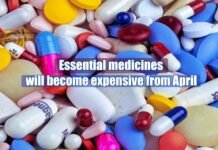
Key Points:
- Starting April 1, 2025, prices of around 1,000 essential medicines will rise by 1.74%, impacting drugs for diabetes, heart disease, cancer, and bacterial infections.
- The hike is based on the Wholesale Price Index (WPI) and aims to offset rising raw material costs.
- Medicines listed under the National List of Essential Medicines (NLEM) will see controlled price adjustments.
New Delhi: The new financial year beginning April 1, 2025, will bring significant changes to medicine prices in India. The government has approved a 1.74% price hike for essential medicines listed under the National List of Essential Medicines (NLEM). This adjustment, based on the annual Wholesale Price Index (WPI), will impact drugs used for common ailments like diabetes, heart disease, cancer, and bacterial infections. Here’s a detailed look at what this means for consumers and the pharmaceutical industry.
Why Are Medicine Prices Increasing?
The National Pharmaceutical Pricing Authority (NPPA) has authorized this price hike to address inflationary pressures and rising raw material costs. Over recent years, the cost of active pharmaceutical ingredients (APIs) and excipients has surged dramatically—some by as much as 130%. For instance:
- Paracetamol prices have increased by 130%.
- Solvents like glycerine and propylene glycol used in syrups and sterile preparations have risen by 263% and 83%, respectively.
- Penicillin G costs have jumped by 175%.
Pharma companies have long demanded price adjustments to counterbalance these escalating expenses. The NPPA’s decision allows manufacturers to increase Maximum Retail Prices (MRPs) without prior government approval under provisions of the Drug Price Control Order (DPCO), 2013.
Which Medicines Will Be Affected?
The price hike applies to approximately 1,000 drugs listed under NLEM. These include:
- Painkillers: Paracetamol and other analgesics.
- Antibiotics: Azithromycin for bacterial infections.
- Anti-diabetics: Medications managing diabetes.
- Cancer Drugs: Chemotherapy and related treatments.
- Heart Medications: Drugs for cardiovascular diseases.
- Vitamins & Minerals: Supplements for nutritional deficiencies.
- Certain steroids and anti-anemia drugs are also included.
These medicines are crucial for treating infections, chronic diseases, neurological disorders, respiratory conditions, gastrointestinal issues, and more.
Impact on Consumers
While the price increase is modest compared to previous years, it will still affect millions of patients relying on affordable healthcare. However, industry experts note that consumers may not feel the impact immediately:
- Pharmacies typically maintain a stockpile of medicines lasting one to two months. Revised prices will take around 90 days to filter through supply chains.
- The hike aligns with NPPA’s mandate to balance affordability with industry sustainability.
Industry Perspective
Pharma companies have welcomed the move as a relief amid rising production costs. Rajiv Singhal, General Secretary of the All India Organisation of Chemists and Druggists (AIOCD), stated that while the increase is small, it provides much-needed breathing space for manufacturers struggling with inflated input costs.
However, industry stakeholders continue to advocate for more substantial hikes in future revisions to better address financial challenges.
About NLEM
The National List of Essential Medicines is curated by the government to ensure affordable access to drugs critical for public health priorities. Updated regularly, its latest version (2022) includes 384 drugs, with additions like insulin glargine and removal of outdated formulations. NLEM serves as a benchmark for pricing regulations under NPPA.
Key Takeaways
- The 1.74% price hike reflects inflation-adjusted revisions based on WPI data from 2024.
- Essential medicines across various therapeutic categories will see controlled increases.
- While pharma companies benefit from cost adjustments, affordability remains a priority under NPPA’s regulatory framework.
Consumers should prepare for slightly higher medicine costs in the coming months but can trust that essential drugs remain regulated to prevent exorbitant pricing.



















































